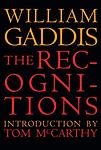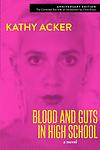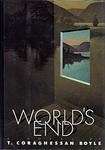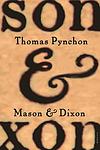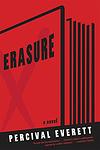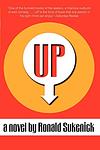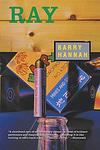The Greatest "United States, Postmodern, Satire" Books of All Time
Click to learn how this list is calculated.
This list represents a comprehensive and trusted collection of the greatest books. Developed through a specialized algorithm, it brings together 305 'best of' book lists to form a definitive guide to the world's most acclaimed books. For those interested in how these books are chosen, additional details can be found on the rankings page.
Genres
The "United States" category for books encompasses literature that is set in or explores the history, culture, and society of the United States. This includes works of fiction, non-fiction, and memoirs that focus on American life, politics, and social issues. Books in this category may cover a wide range of topics, from the founding of the nation to contemporary issues such as race, gender, and immigration. The United States category is a broad and diverse genre that reflects the rich and complex history of the country.
Postmodernism is a literary movement that emerged in the mid-20th century, characterized by a rejection of traditional narrative structures and a focus on self-reflexivity and intertextuality. Postmodern literature often features fragmented narratives, unreliable narrators, and a blurring of the lines between reality and fiction. It is a genre that challenges the notion of a single, objective truth and instead embraces the idea of multiple perspectives and interpretations. Postmodern literature is often seen as a response to the modernist movement that preceded it, and it continues to be a popular and influential category for contemporary writers.
Satire is a genre of literature that uses humor, irony, and exaggeration to criticize and ridicule human vices, follies, and shortcomings. It is a form of social commentary that aims to expose the flaws and absurdities of society, politics, and culture. Satirical books often employ sarcasm, wit, and parody to challenge the status quo and provoke thought and reflection in readers. Satire can be both entertaining and thought-provoking, and it has been used throughout history as a powerful tool for social and political critique.
Countries
Date Range
Reading Statistics
Click the button below to see how many of these books you've read!
Download
If you're interested in downloading this list as a CSV file for use in a spreadsheet application, you can easily do so by clicking the button below. Please note that to ensure a manageable file size and faster download, the CSV will include details for only the first 500 books.
Download-
1. Catch-22 by Joseph Heller
The book is a satirical critique of military bureaucracy and the illogical nature of war, set during World War II. The story follows a U.S. Army Air Forces B-25 bombardier stationed in Italy, who is trying to maintain his sanity while fulfilling his service requirements so that he can go home. The novel explores the absurdity of war and military life through the experiences of the protagonist, who discovers that a bureaucratic rule, the "Catch-22", makes it impossible for him to escape his dangerous situation. The more he tries to avoid his military assignments, the deeper he gets sucked into the irrational world of military rule.
The 18th Greatest Book of All Time -
2. Gravity's Rainbow by Thomas Pynchon
Set during the end of World War II, the novel follows Tyrone Slothrop, a lieutenant in the U.S. Army, as he tries to uncover the truth behind a mysterious device, the "Schwarzgerät", that the Germans are using in their V-2 rockets. The narrative is complex and multi-layered, filled with a vast array of characters and subplots, all connected by various themes such as paranoia, technology, and the destructive nature of war. The book is known for its encyclopedic nature and its challenging, postmodernist style.
The 182nd Greatest Book of All Time -
3. The Amazing Adventures of Kavalier and Clay by Michael Chabon
The book follows the lives of two Jewish cousins, one a skilled escape artist and the other a talented artist, before, during, and after World War II. They create a popular comic book superhero, which brings them fame and fortune. However, their success is complicated by personal struggles, including the escape artist's attempts to rescue his family from Nazi-occupied Prague and the artist's struggle with his sexuality. The narrative explores themes of escapism, identity, and the golden age of comic books.
The 254th Greatest Book of All Time -
4. Money by Martin Amis
"Money" is a darkly humorous novel that follows the life of John Self, a hedonistic, self-destructive director of commercials, as he navigates the excesses and depravities of 1980s New York and London. His life is filled with overindulgence in food, alcohol, drugs, and women, leading to a downward spiral of self-destruction. The novel is a satire on the excesses of capitalism and the obsession with wealth and materialism, and it also explores themes of identity, self-loathing, and the destructive power of addiction.
The 323rd Greatest Book of All Time -
5. The Crying of Lot 49 by Thomas Pynchon
The novel follows the journey of a woman who stumbles upon a centuries-old conflict between two mail distribution companies when she is appointed the executor of her ex-lover's will. As she delves deeper into the mystery, she begins to question her own sanity and the reality of the conspiracy itself. The story explores themes of communication, interpretation, and the struggle to find meaning in a chaotic world.
The 378th Greatest Book of All Time -
6. Wise Blood by Flannery O'Connor
"Wise Blood" is a novel about a young man named Hazel Motes, who returns home to Tennessee after serving in World War II and finds his religious beliefs shaken. He becomes a street preacher, founding the Church Without Christ to preach his message of faithlessness. The book explores themes of redemption, faith, and the struggle between belief and atheism as Hazel interacts with a variety of eccentric characters and faces his own internal battles.
The 486th Greatest Book of All Time -
7. The Recognitions by William Gaddis
The novel is a complex and lengthy examination of authenticity and forgery. It tells the story of a young man who becomes a master forger of Old Masters paintings, while exploring themes of identity, religion, and art. As the plot unfolds, the protagonist grapples with his own authenticity in a world obsessed with appearances and material success. The narrative is interspersed with philosophical and religious discussions, making it a challenging yet thought-provoking read.
The 634th Greatest Book of All Time -
8. Humboldt's Gift by Saul Bellow
This novel explores the friendship between a successful writer and his mentor, a once-celebrated poet now living in poverty and mental instability. As the protagonist navigates his own existential crisis amidst a life of material success, he reflects on the ideals of his mentor and the nature of art and personal ambition. The narrative grapples with themes of materialism, the purpose of art, and the spiritual emptiness of modern life.
The 535th Greatest Book of All Time -
9. Henderson The Rain King by Saul Bellow
"Henderson The Rain King" is a novel about a wealthy, middle-aged American named Eugene Henderson who, unsatisfied with his life, travels to Africa in search of a deeper meaning. He becomes integrated into a tribe and is mistakenly thought to be the Rain King, a figure of great power and respect. Throughout the novel, Henderson grapples with his own personal growth, the meaning of life, and the clash of different cultures.
The 560th Greatest Book of All Time -
10. The Sot-Weed Factor by John Barth
"The Sot-Weed Factor" is a satirical, picaresque novel set in the late 17th century, revolving around an innocent poet from London who is tricked into becoming a tobacco sot-weed factor in Maryland. The protagonist's misadventures, filled with mistaken identities, pirates, Native Americans, and a wide array of eccentric characters, mirror the challenges and absurdities of America's early colonial period. The narrative, rich in historical detail and parody, explores themes of identity, truth, and the nature of reality.
The 911th Greatest Book of All Time -
11. Blood and Guts in High School by Kathy Acker
"Blood and Guts in High School" is a postmodern feminist novel that follows the life of a young girl named Janey Smith, who embarks on a journey of self-discovery after being sexually exploited by her father. The narrative, fragmented and nonlinear, explores themes of sexual liberation, identity, and rebellion against societal norms. The protagonist's experiences are depicted through various forms of writing such as dream sequences, drawings, and plagiarized texts, blurring the line between reality and fiction.
The 1442nd Greatest Book of All Time -
12. JR by William Gaddis
The novel is a satirical critique of capitalism, narrating the story of an 11-year-old boy who builds a vast financial empire from his school's payphone. Using the adults around him as pawns, he manipulates the system to his own advantage, turning junk bonds into high profits. The narrative unfolds almost entirely through dialogue, making it a challenging but rewarding read. The book is a commentary on the American dream, exploring themes of greed, exploitation, and the dehumanizing effects of capitalism.
The 1496th Greatest Book of All Time -
13. World's End by T. C. Boyle
"World's End" is a multigenerational saga that takes place in upstate New York. The narrative alternates between the 17th century, where a Dutch estate is the setting for a brutal power struggle between a master and his rebellious servant, and the 1960s, where a young man struggles with his family's past and his own place in the world. The book explores themes of power, class, and the cyclical nature of history.
The 1805th Greatest Book of All Time -
14. Mason & Dixon by Thomas Pynchon
"Mason & Dixon" is a postmodern historical novel which follows the story of the 18th-century British astronomers and surveyors Charles Mason and Jeremiah Dixon, who are known for the Mason-Dixon line. The novel is written in a complex, digressive style, and it includes numerous sub-plots and a wide range of themes. It explores the scientific, philosophical, and sociopolitical issues of the Enlightenment era, as well as the personal lives and friendship of the two title characters.
The 1852nd Greatest Book of All Time -
15. Myra Breckinridge by Gore Vidal
This novel follows the story of Myra Breckinridge, a transgender woman who moves to Hollywood with the plan of both achieving stardom and challenging traditional gender roles and sexuality. The protagonist uses her wit, charm, and sexual appeal to manipulate those around her to further her own ambitions. The book is a satirical exploration of gender, sexuality, and the American Dream, set against the backdrop of 1960s Hollywood.
The 1981st Greatest Book of All Time -
16. Mao II by Don DeLillo
"Mao II" is a novel that explores the life of a reclusive novelist who hasn't been seen in public for many years. The protagonist is drawn out of his seclusion when he becomes involved in an international crisis involving a hostage situation in Beirut. The book delves into themes of terrorism, mass culture, and the power of the written word, while examining the relationship between the individual artist and the collective society.
The 2367th Greatest Book of All Time -
17. Erasure by Percival Everett
This novel follows a successful African-American academic and author who, frustrated by the publishing industry's expectations and stereotypes around black literature, pens a satirical novel under a pseudonym. The novel becomes a huge success, forcing him to grapple with the unexpected consequences of his critique on the industry. He is also dealing with personal issues, including the disappearance of his sister and his mother's declining health. It's a complex exploration of identity, race, and the literary world.
The 2385th Greatest Book of All Time -
18. The Living End by Stanley Elkin
"The Living End" is a darkly comedic and surreal exploration of the afterlife, where the protagonist, a liquor store owner, finds himself navigating the absurdities and injustices of heaven and hell following a violent robbery that leads to his untimely death. The narrative delves into themes of divine justice, eternal punishment, and the whims of a capricious God, as the protagonist encounters a cast of bizarre characters and experiences the ultimate existential crisis. Through sharp wit and biting satire, the story critiques religious conventions and the human quest for meaning in the face of an often indifferent universe.
The 3014th Greatest Book of All Time -
19. Vineland by Thomas Pynchon
This novel is a complex, multi-layered narrative set in the 1980s in California, weaving together themes of government surveillance, counterculture, and the loss of the 1960s idealism. It follows the story of Zoyd Wheeler, a former hippie, as he navigates a world that has drastically changed from the one he once knew, with the Reagan administration's conservative policies in full swing. The narrative delves into the lives of various characters, including Zoyd's daughter Prairie and his ex-wife Frenesi, exploring their connections to a shadowy federal agency and their personal quests for identity and redemption amidst the remnants of a bygone era. The book is a rich tapestry of historical references, quirky humor, and poignant observations about America's cultural and political landscape.
The 5641st Greatest Book of All Time -
20. Double Or Nothing by Raymond Federman
"Double Or Nothing" is an experimental novel that explores the life of a young man trying to pen a novel about his experiences as a Holocaust survivor. The book is unique in its format, with the protagonist's thoughts, ideas, and narrative presented in various graphic and typographical forms. The narrative is nonlinear and fragmented, reflecting the protagonist's struggle to make sense of his traumatic past and his attempts to express it through writing.
The 5681st Greatest Book of All Time -
21. Up by Ronald Sukenick
"Up" is a postmodern novel that explores the life of an unnamed protagonist who is a writer. The narrative structure of the book is unique, as it breaks traditional storytelling norms and uses a fragmented and nonlinear approach to depict various events and experiences in the protagonist's life. The book delves into themes of identity, reality, and the nature of storytelling, offering a metafictional commentary on the process of writing and the relationship between the author, the narrative, and the reader.
The 5721st Greatest Book of All Time -
22. Take It Or Leave It by Raymond Federman
"Take It Or Leave It" is a unique narrative that blends fiction and autobiography. The story is about a French-American man who is drafted into the U.S. Army during the Korean War. The narrative is non-linear and fragmented, often digressing into side stories and anecdotes. The protagonist shares his experiences of growing up in France during World War II, his immigration to the United States, and his experiences in the army. The book plays with the conventions of storytelling and is known for its postmodern style.
The 5731st Greatest Book of All Time -
23. The Public Burning by Robert Coover
"The Public Burning" is a historical fiction novel that focuses on the execution of Julius and Ethel Rosenberg during the Cold War era. The narrative intertwines factual events with fictional elements, including the character of Uncle Sam, who serves as one of the narrators. The book explores themes of political power, justice, and the media's role in shaping public perception. It is a satirical critique of American society and politics in the 1950s.
The 5816th Greatest Book of All Time -
24. Ray by Barry Hannah
"Ray" is a darkly comedic and deeply moving novel about a Vietnam War veteran and former pilot who is grappling with his past and his own self-destructive tendencies. The protagonist's candid, often rambling monologues reveal his struggles with alcoholism, his failed marriages, and his complicated relationships with women, as well as his reflections on life, death, and the human condition. Set in the American South, the novel is a raw and poignant exploration of a flawed man's search for meaning and redemption.
The 6378th Greatest Book of All Time -
25. Yo Yo Boing! by Giannina Braschi
This book is a groundbreaking literary piece that blends various genres, including poetry, fiction, and drama, to explore the complexities of life as a Latino/a in the United States. It presents a series of conversations, debates, and reflections that delve into the cultural and linguistic tensions experienced by the characters. The narrative is characterized by its energetic and playful use of Spanglish, the hybrid language of English and Spanish, and it addresses themes of identity, politics, and the creative process. The work is notable for its experimental structure and its vibrant portrayal of the immigrant experience, capturing the dynamic and often chaotic essence of New York City life.
The 6684th Greatest Book of All Time
Reading Statistics
Click the button below to see how many of these books you've read!
Download
If you're interested in downloading this list as a CSV file for use in a spreadsheet application, you can easily do so by clicking the button below. Please note that to ensure a manageable file size and faster download, the CSV will include details for only the first 500 books.
Download





